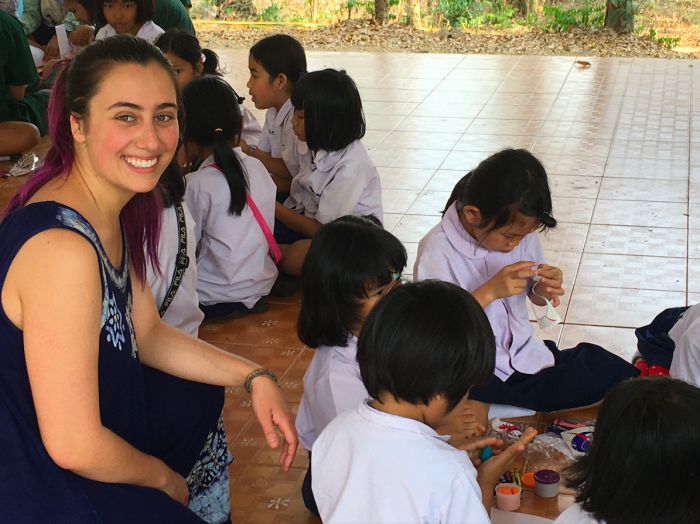For most of my teenage years, I chased after happiness only to realize I was chasing a mirage in the desert heat of depression.
I searched for happiness in others. I put my happiness in their hands in hopes that they would somehow fix me or fill in the missing pieces that left me feeling empty. If only a person loved me enough, I would feel happy and fulfilled.
I thought happiness was not feeling sadness. I saw it as an end goal, rather than a lifestyle or mindset. Little did I realize, at the time, the happiness I longed for could be found within my own heart.
Research has found that living an engaged and meaningful life can bring the most sustainable form of happiness, and there’s an accumulation of factors that play a role in attaining this happiness, or more so, the feeling of life satisfaction. It consists of personal experiences, circumstances, and how you perceive the challenges that arise in life.
Living a life aligned with your values, having a realistic mindset, knowing that you can feel sad and satisfied with life at the same time, and the ability to unconditionally love and forgive yourself for past mistakes are the stepping stones to living a fulfilled, engaged, and meaningful life.
A team of psychologists studied happiness to get down to the root of what brings people true, fulfilling happiness. Seligman came to find three types of happiness: the pleasant life, the good life, and the meaningful life.
A pleasant life consists of many pleasures and positive emotions as possible, paired with learning mindfulness skills that amplify and prolong those positive feelings. The only issue with the pleasant life type is that pleasures can get old and need to be replaced with different ones in order to stimulate the mind in new ways—you’ll eventually get tired of listening to your favorite song if overplayed.
Seligman states that “positive psychology is more than positive emotion, more than building pleasure,” because life isn’t all pleasure, everyone experiences hardships in some form or another.
The second form of happiness is called “the good life” or the engaging life. He describes it as an active and involved life—doing something you love.
Getting lost in something you love brings you into the flow state of mind.
While in the flow of intense concentration, you can’t feel anything or think about anything else, absorbing into something you enjoy—it could even be considered reaching a meditative state.
I’ve experienced this first hand when organizing things in my home, dancing, creating art, yoga, or writing a song. Art and songs create themselves when I am absorbed into the flow. You can reach the flow state by doing anything. Csikszentmihalyi also discusses how it’s important to be happy with what you do with your time and feel as though you are contributing to the world in a positive way.
Now, this brings me to Seligman’s third type of happiness, the meaningful life. By this, he means living your “most venerable,” philanthropic life; using your “highest strengths to belong to and in service of something larger than you.” He says that this seems to be the most sustainable form of happiness because it fills you with a lifetime of gratitude. This can look like charitable acts of kindness, volunteering, or fulfilling your dreams and having a positive impact on the world around you—everyone is unique in what brings them to this feeling.
Building happiness can look like putting in the work to face your deep childhood wounds, limiting beliefs, and unhealthy habits (which can be done through practicing positive intervention strategies and reading self-help books). It can look like mindful gratitude for each day, and following your heart’s desires (living a meaningful life).
Doing something fun-healthy and unhealthy also brings you short-term happiness. I am not saying we shouldn’t have any fun, but there is more to life that can bring you sustainable, long-term happiness, such as philanthropic acts of kindness, accomplishing goals, and feeling gratitude for each moment.
Some people are killing themselves by trying to attain happiness in unsustainable, short-term forms. For example, escaping through drugs or working long hours at a depressing job to earn an amount of money to finally have everything they need to feel happy—this is unsustainable.
How does this relate to having an engaged and meaningful life?
Based upon my personal reflections, I’ve learned how to feel compassion toward myself and learned to forgive myself. When I learned to forgive myself, I also learned how to forgive others and move past the depression that was holding me back.
“If you are depressed you are living in the past. If you are anxious you are living in the future. If you are at peace you are living in the present.” ~ Lao Tzu
I stopped living in the past (well, I’m not perfect—I still have some things to move on from—but I’ve come a long way). Learning to move forward from the past has helped me focus my energy on improving myself to live a life that is more aligned with my values; discovering what I love and what makes me happy.
It has also helped me learn to take the good with the bad—to see the light in all the dark times. Through all of this, I’ve become more engaged. I’ve found passions that bring me into a state of flow. And through that, I have found ways to bring more meaning into my life and what I do.
Last January, right before the coronavirus pandemic hit, I traveled to Hawaii alone and then on to a retreat center in Thailand. In doing this, I gained a feeling of autonomy. I gained so much love and appreciation for myself, simply for treating myself to such an experience.
I pushed my limits and my comfort zone to the maximum. I tasted new food, woke up before sunrise each morning for yoga and tea, and barely spent any time on my phone. While in Thailand, we volunteered at a children’s school. We donated books and supplies and built a playground. We served food and snacks and taught children’s songs in English.
This experience will overflow my heart with gratitude forever.
This was my first time volunteering for anything, and it was a high like no other. The memory in itself leaves me feeling euphoric. I felt like I was contributing something good to the world. Even as I write this, I’m fulfilling my purpose because I love discussing the topic of happiness. Positive psychology is my domain; it’s part of my career path and passion.
This is how it all comes together to create a meaningful life. It looks different for everyone, and what is meaningful to you will be unique to you.
Happiness is a culmination of multiple variables that play a role in attaining the feeling of a fulfilled life. These variables consist of genetics, self-esteem, personal experiences, and the circumstances of how you perceive and deal with the challenges that arise in life. Learning to love and forgive ourselves creates space to learn and grow from the mistakes and hardships in life, and to make the best of a not-so-good situation.
It helps us see that things can change for the better, that we can live a life aligned with our values, and we can create a more engaging and meaningful life for ourselves. Happiness is attainable if you believe it to be possible for yourself.
Happiness is not an end goal, it’s a lifestyle.


 Share on bsky
Share on bsky





Read 8 comments and reply